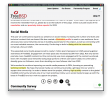I've used Linux primarily since Windows 10 came out (2015 or 16), and as of a few days ago tried FreeBSD 14.1. I am absolutely loving it!
On Linux I've only done Arch Linux a few times (the cli ground-up to desktop), but generally stuck to Ubuntu, Fedora, or openSUSE (GUI installers, pretty DE o-t-b). I didn't think I'd like it with FreeBSD for fear of being annoying for reinstalls, but I'm learning more about FreeBSD's file structures and configs (handbook is awesome), taking careful notes, and I'm finding I don't have any real reason to consider a reinstall yet! I'm using Xfce, and
have my 14.1 notes here.
My initial concerns were with a few games and Wine. Early on I installed wine-devel and winetricks, winetricks told me some pkg32-like command to run for 32-bit support, I ran it (impressed that worked

), and got Diablo II working. I'm impressed
my Linux notes for D2 were so good that they worked as-is on FreeBSD (the prefix, wine on installers, glide wrapper, and cli starting)

but I'm also impressed I can seemingly take most of what I did on Linux right on-over to FreeBSD with little tweaking (
FreeBSD D2 notes)!
I have my desktop set-up mostly down enough to be productive and play games (still need to check 2004scape and WoW), but I'm eager to get FreeBSD on my server next! Looks like nginx, php-fpm, and MariaDB are all available, and I expect it to be pretty easy for a first-time BSD server experience

I was using Fedora Workstation primarily 20-something until 38 or 39 no problem, but
I started experiencing a gamble with logging in from GNOME. I figured it'd just get-fixed eventually, but it continued with Fedora 40. I tried Plasma 6 fresh on F40, and
ran into OOM killer really making me question what developers are prioritizing. I went to openSUSE TW GNOME for a bit because it didn't have that unstable log-in, but it started happening there too eventually (guess some update). I greatly dislike Wayland. systemd I let pass but started questioning that a while back when VPN connections could leak through it because it had its own DNS rules or something. Fedora forums are more and more populated with Atomics and other non-Workstation stuff, and they even added an AI chat bot. All that, paired with GNOME and Plasma prioritizing Wayland without session restores making unrelated apps/work held-hostage if the DE gets huffy, GNOME being broken, and no mainstream distro prioritizing Xfce or Xorg has me not interested in Linux's future.
The first time I was almost interested in installing BSD was with DragonflyBSD a couple years back, but I heard it was odd about newer AMD GPUs while also being the best BSD for newer GPUs (I don't quite remember specifics but I had RX 580 or 6600 XT). I've messed with Hackintosh (PearOS, Tiger, up to SL) and kind-of had a taste of BSD already, but right now is the most I've ever really dived into it






